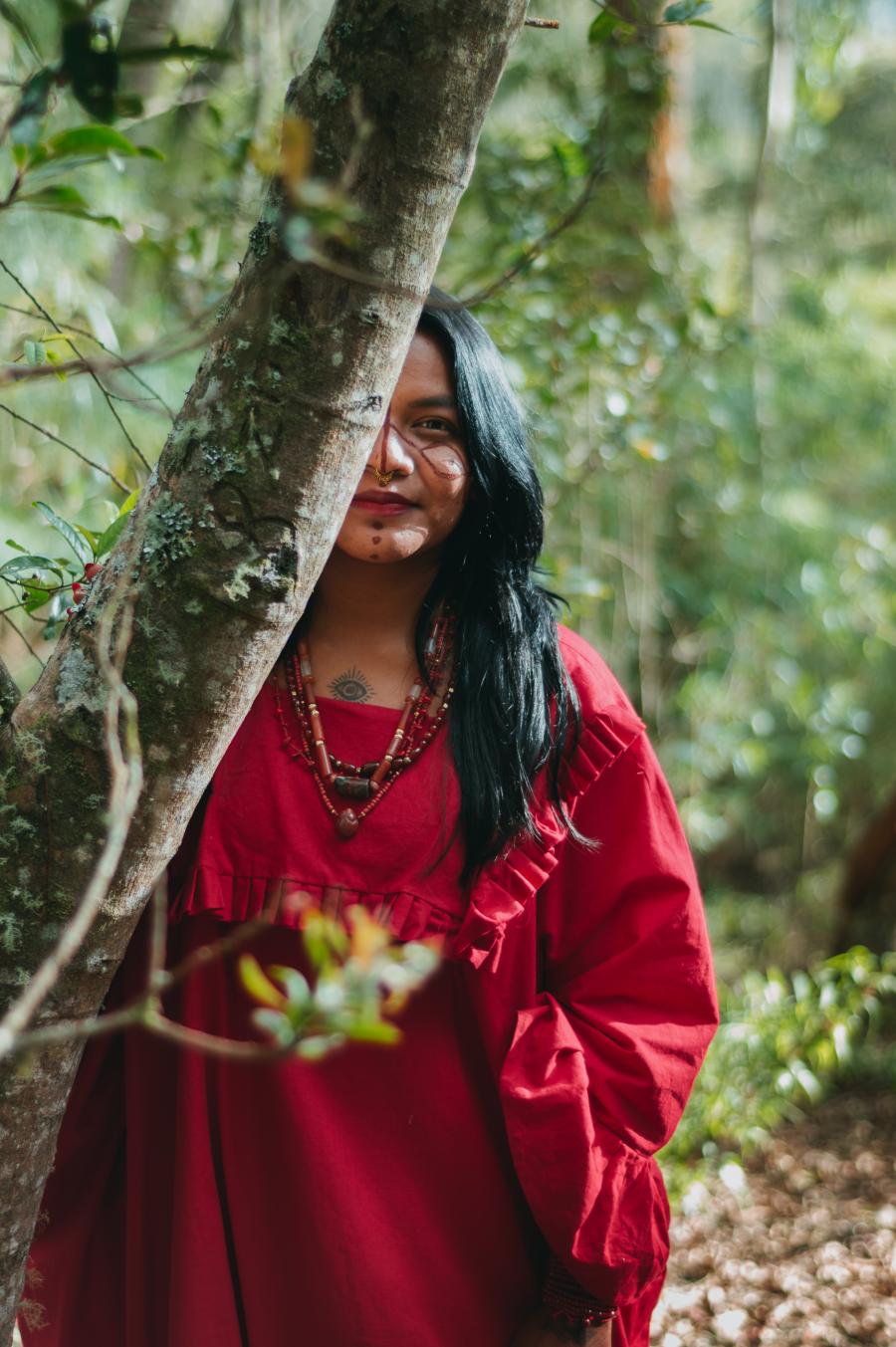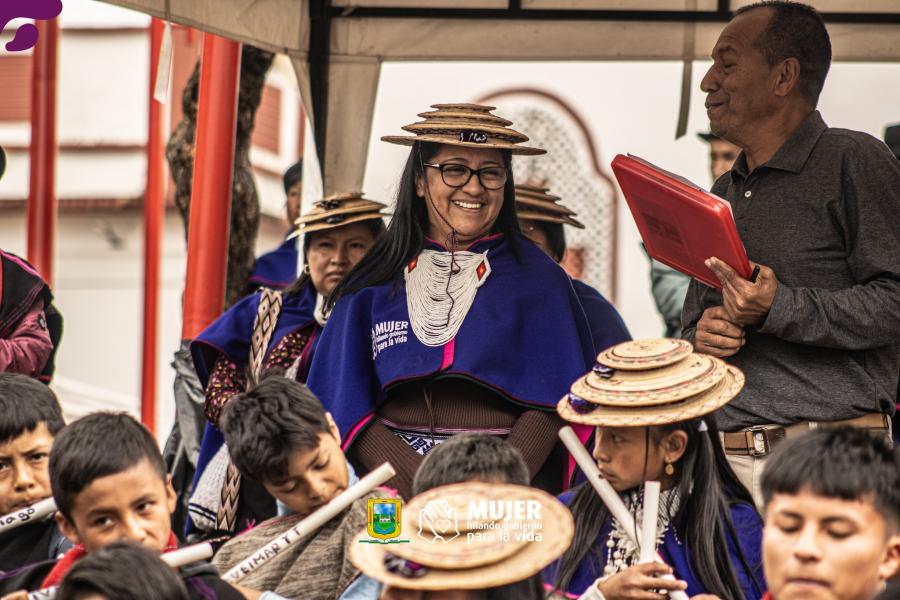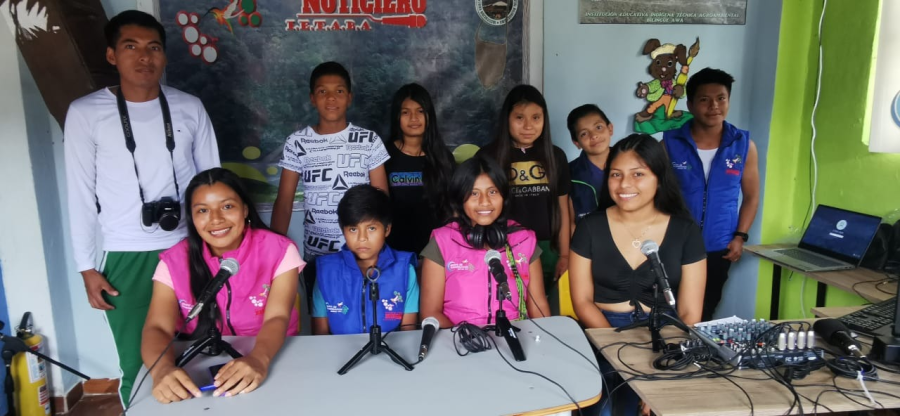Since July 2000, the United States has spent more than $1.3 billion in taxes on military and police aid to Colombia, primarily for counter-narcotic programs. More than $500 million have been spent on a massive anti-drug operation in the southern Amazonian region of Colombia that includes the aerial spraying of herbicides to eradicate illicit coca crops. In the past two year, indigenous activism opposing aerial spraying has raised the awareness of Washington, D.C. policy-makers, brought about greater scrutiny of the aerial spraying program, and strengthened U.S. civil society advocacy for a more just policy toward Colombia.
The administrations of U.S. President George W. Bush and Colombian President Álvaro Uribe Vélez would rather not publicize the health and ecological consequences of the aerial spraying program. But Colombian indigenous and peasant organizations in the affected regions have braved the political, and potentially violent, repercussions to tell their stories in Colombia and internationally. They have taken the stories of affected communities and the call to suspend aerial spraying to the halls of Congress, to the Bush administration, and to press conferences and meetings of U.S.-based non-governmental policy and human rights groups.
Colombian indigenous organizations have traveled to Washington, D.C., for varied reasons. For some, lobbying policy-makers to redirect U.S. aid and finding potential allies to advocate for indigenous rights is foremost in importance. According to José Soria, general secretary of the Organization of Indigenous Peoples of the Colombian Amazon (OPIAC): "Today more than ever we see how each day the government limits our options for achieving our aspirations as distinct societies. For this reason, it is critical to meet with those U.S. support organizations and congressional lawmakers who believe in the struggle for the revival of our peoples. In our visit to the U.S., we clearly stated that Plan Colombia is a plan for war, not for building the peace that Colombia needs. It is a plan that will devastate existing life in the Amazon that is our home. The U.S. aid for Plan Colombia could only help to build peace if it was invested in real social development programs for peasants and for the cultural revival of indigenous peoples. This is the goal that we have, and why we continue working."
Other indigenous organizations take their message to Washington because they are frustrated by the lack of a response from the Colombia government. "Our government doesn’t listen to us, despite the fact that our rights are recognized in the Colombian Constitution," says a leader of the Indigenous Organization of the Putumayo Zone (OZIP). "For this reason we have to appeal to other sources so that our message can be heard on the international level and pressure can be placed on the Colombian government. Educating U.S. Congress members and the American public is of extreme importance."
From the beginning, the participation of Colombian indigenous leaders in events in Washington has been critical in increasing awareness of American policy-makers and the public about U.S.-supported aerial coca eradication. After the first U.S. aid package to Colombia was passed in July 2000, Amazonian indigenous leaders were among the first Colombians to visit Washington to denounce U.S. funding for the aerial spraying program. They had seen the results of aerial coca eradication in Colombia since 1994 and had no illusions about the consequences of an intensified aerial spraying campaign. At a press conference on U.S. Capitol Hill on November 16, 2000, a leader of OPIAC faced a crowd of reporters, congressional aides, and U.S. State Department officials, and declared: "Aerial herbicide spraying violates our rights and territorial autonomy. It has intensified the violence of the armed conflict and forced people to leave their homes after their food crops have been destroyed. The spraying in Colombia must be terminated immediately." At that press conference, another indigenous leader from OZIP, along with U.S. and Colombian environmental scientists and drug-policy experts levied the first major criticisms of the aerial spraying program. Their efforts launched a U.S. campaign to suspend aerial eradication in Colombia and provided the basis for a new Web site (usfumigation.org) dedicated to providing information on the spraying program for journalists, grassroots activists, and concerned citizens.
The activism of Colombian indigenous leaders in Washington was also instrumental in bringing about a rigorous assessment of the spraying program. In March 2002, indigenous leaders from OPIAC and OZIP teamed with several Colombian allies to meet face-to-face with 20 administrators and scientists of the U.S. Environmental Protection Agency (EPA). The 2002 U.S. foreign aid act required the U.S. State Department to submit a report to Congress, after consultation with the EPA, showing that the chemicals used in the aerial spraying program posed no unreasonable risks or adverse effects to humans or the environment. The meeting was organized so the Colombian delegation could express their concerns about the program directly to the EPA and ask the agency to complete a rigorous assessment of health and environmental risks. According to agency sources, the testimonies of the indigenous leaders and other Colombians made a strong impact on EPA officials and motivated them to focus greater attention on the analysis. The meeting, coupled with follow-up pressure from U.S. support groups, encouraged the EPA to produce an analysis that was in many ways a cautious and critical assessment of the health and environmental risks of the aerial spraying program.
The EPA portion of the State Department report was not complete and failed to respond to all salient concerns, but it was nonetheless a far more rigorous and fair assessment than would have ever been expected. Although the State Department report to Congress downplayed and ignored many of the concerns highlighted in the EPA analysis, the State Department did agree to EPA’s recommendation to switch to a less toxic herbicide mixture. Continued congressional scrutiny of the EPA analysis may lead to other changes in the spraying program as well.
Finally, continued advocacy work between Colombian indigenous organizations and U.S. policy and indigenous rights groups active on Capitol Hill has ensured that U.S. Congress members are kept informed about the costs of aerial eradication and pressured to take action. By participating in U.S. speaking tours and grassroots education events sponsored by allied U.S. organizations, Colombian indigenous leaders have reached out to American voters and encouraged them to educate their lawmakers on this issue. Indigenous organizations have also worked with U.S. partners to distribute their press releases and reports about aerial spraying to U.S. policy-makers. The coorinated efforts have increased the pressure on Washington lawmakers to suspend U.S. funding for aerial eradication, and strengthened U.S. civil society efforts.
Outlook
U.S. Congress members have responded to this joint-advocacy work. Legislators such as Senators Patrick Leahy, the late Paul Wellstone, and Russ Feingold, and Representatives Jan Schakowsy, Ike Skelton, Nancy Pelosi, and John Conyers have been highly critical of current U.S. policy toward Colombia. Their interventions on the House and Senate floors have encouraged a growing number of policy-makers to question the wisdom and effectiveness of the United States’ Colombia policy. This consciousness among U.S. lawmakers led to positive changes in the last U.S. aid package to Colombia: In the 2002 foreign aid act, Congress directed the U.S. Secretary of State to meet various requirements regarding the aerial spraying program. In addition to requiring the EPA consultation, the foreign aid act also required that the State Department show the program is carried in accordance with U.S. label regulations and Colombian law, that procedures are available to evaluate claims of health harm or damage to legal food crops and provide compensation for meritorious claims, and that alternative development programs exist in sprayed areas. In the Senate version of the 2003 foreign aid bill, these aerial spraying program requirements are even stronger--but they have been gutted in the markup of the House of Representatives’ version of the bill. The results for next year remain to be seen, but the inclusion of these requirements in the 2002 foreign aid act and the Senate 2003 foreign aid bill signifies that outcry from Colombia’s indigenous people and U.S. groups is having an impact. Despite some positive responses in Congress, the Bush administration intended to spray nearly 375,000 acres for coca eradication in 2002 and a record 500,000 acres in 2003. Uribe told the United Nations in September 2002 that "under no political circumstance will they suspend the aerial spraying of illicit crops in Colombia."[1]
Faced with the prospect of intensified aerial spraying, Colombian indigenous organizations will no doubt continue to advocate for an end to the aerial eradication program. Cross-country speaking tours, delegations to Washington, press conferences, and grassroots mobilizations are resource-intensive projects and require support from a dedicated coordinating organization and concerned volunteers. However, the effectiveness of their efforts in the United States depends largely on support from U.S. organizations and citizens. Carmen Gonzales, a Seattle University law professor active in Colombia-related issues, has seized the opportunity to help. "One of my goals as a law professor is to foster a sense of social responsibility among students," she said. "It is critical for students to listen to indigenous community representatives in order to understand the causes and consequences of the ongoing conflict in Colombia and to understand the role of U.S. foreign policy." Certainly, the greater the number of U.S. groups and individuals working to magnify the voice of Colombian indigenous organizations, the sooner we will see a more just U.S. policy toward Colombia.
1. "Colombia No Suspenderá Fumigaciones," CNE, September 12, 2002.
Betsy Marsh is the program coordinator at the Amazon Alliance, a Washington, D.C.-based coalition of indigenous- and traditional-peoples organizations from the Amazon Basin and environmental and human rights groups from North and South America.



